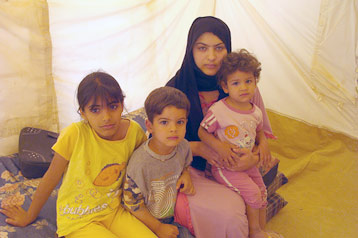Situation of Palestinians on Iraq-Syria border continues to deteriorate
Situation of Palestinians on Iraq-Syria border continues to deteriorate
The situation of more than 2,700 Palestinians who have been stranded and are living in inhumane conditions in two border camps at the Iraq-Syrian border continues to deteriorate. Over the past 22 months, UNHCR has been calling for urgent humanitarian solutions for this group and - even if only temporary - relocation elsewhere, preferably in the Arab region. In 2006, Canada accepted 64 Palestinians from Iraq, while Brazil last year received 107. In a more recent development, Chile - itself once a refugee-producing country - offered to receive for resettlement an initial group of 117 Iraq Palestinians. They are expected to depart in April. Sudan has also offered to accept 2,000 Iraq Palestinians, and UNHCR together with Palestinian representatives is finalizing an operations plan that will enable this to take place. UNHCR appreciates all of these responses and we hope that all of the Palestinians will be able to leave the harsh conditions of the camps sooner rather than later. Their relocation would in no way jeopardize their right to return at any stage, if and when such a possibility arises.
This solution, however, will not help all of the Palestinians in the camps, where the health situation has become increasingly dire as proper medical care and viable alternatives are lacking. In the past 14 months, 12 refugees have died in the camps, with the last one - a 25-year-old man - dying in Al Waleed refugee camp two weeks ago, most likely of food poisoning. His family's case had first been submitted for urgent resettlement on medical grounds in July 2007.
The deaths highlight the urgent need for humane solutions and proper medical care for the destitute population. In 2007, 19 medical cases departed from Iraq for medical resettlement to Norway, Sweden, Denmark and New Zealand. Seven of the cases were Palestinian families. UNHCR appreciates all efforts by third countries to assist in urgently resettling such cases and remind governments that there is still a need for further help in dealing with acute cases - many of which have gone without proper care for far too long.
Palestinian health workers in Al Waleed camp - who see patients on a daily basis - have identified various people with medical conditions ranging from diabetes, birth defects, kidney problems, cancer and serious trauma. The nearest proper medical facility, however, is inside Iraq, more than 400 km away. There is no ambulance service and patients have to be transported by taxi. Neighbouring countries have restricted entry requirements, particularly for Palestinians, and it is extremely difficult to admit patients with urgent medical needs for treatment.
Over the past year, UNHCR has noted dramatic medical needs among the refugees fleeing Iraq. Medical care is not readily available in Iraq, with most of the health personnel having fled. Hospitals and clinics are poorly stocked with outdated equipment and lack of electricity. Many refugees fleeing Iraq have severe physical and psychological needs. Psychological stress and strains encountered by years of conflict, violence, displacement and uncertainty have weakened people's natural resistance to disease.
Of the estimated 34,000 Palestinians in Iraq in 2003, it is believed that some 10,000-15,000 remain in the country. Al Waleed camp is presently home to over 2,000 refugees while Al Tanf camp, situated in the no-man's land between Iraq and Syria, has doubled in size since October 2007, with over 710 refugees living there. While UNRWA - the United Nations Relief and Works Agency - is mandated with taking care of Palestinian refugees in the Near East, UNHCR is responsible for the Palestinians who live or have lived in Iraq or outside the UNRWA area of responsibility.







